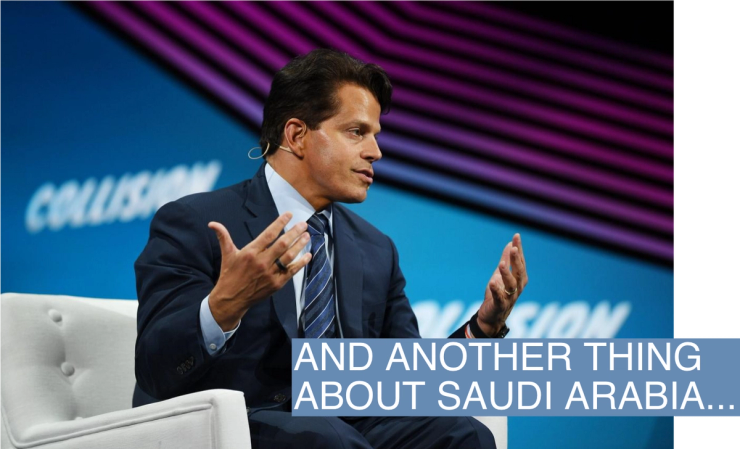The News

I follow Anthony Scaramucci on Twitter, now under new management, and saw that he was at the FII (Future Investment Initiative) in Riyadh, Saudi Arabia. One of the things that fascinates me about the man often referred to as “The Mooch” is that he often engages in candor that bites the hand that feeds him. He did that with Donald Trump. And in the exchange I had with him below on Thursday, he jabs Dems for their “virtue signaling” and the Republicans for “owning.” It’s juicy.
But what I didn’t expect and found a bit refreshing was his awareness of historical cycles and that, while things may be tough with China and Russia and the Saudis, those cycles mean these relationships usually swing from hot to cold and back. He sees zero daylight between the U.S. and Saudis long term - which is not what one hears on Pennsylvania Ave in the wake of Jamal Khashoggi’s murder and continued disagreements over foreign policy and oil production. And on China, he is hopeful that pragmatism and cooler, less paranoid heads may swing that relationship back towards cooperation. Again, that’s not a perspective you hear very much among America’s “strategic class.”
Here’s the exchange -- just two questions:
STEVE CLEMONS: What’s the vibe at FII? Saudi Arabia? the region post-OPEC cuts?
ANTHONY SCARAMUCCI: Steve, the relationship between the Saudis and the US is unbreakable. It’s a great friendship. It goes back to the founder of the country, Ibn bin Saud, Saudi Arabia’s George Washington, and to Franklin Roosevelt, and I don’t think the current sore points or the current disappointment due to the American political situation is going to overly hurt that relationship long term.
Again, these are my opinions. But I think they’re grounded in the mutuality of interests of both countries. We share a tremendous amount of resources. We share technology. We’ve obviously trained their military. They own a lot of our military equipment as a result of that training. They are a regional ally, and they are somebody providing support and stability to the region. And so for all of those reasons, I don’t think that the current kerfuffle in the relationship is going to be long term damaging.
Now, having said all of that, this is where I think the administration would be upset with me, but I think this is very, very important because we have to break the “virtue signaling” and the “owning.”
And so let me define both of those because the radical left believes in “virtue signaling” and they believe in canceling people that are not going to adhere to what they believe are the right virtues.
And the radical right? They want to “own” the liberals. They want to do things like fly innocent people to blue states in an effort to own the liberals, even though they’re actually hurting human beings.
And so my opinion on all this stuff is that I’m not about left or right, but I’m about right or wrong.
And so look at it analytically. Look at it empirically. The United States was on course to become energy independent. I recognize that we have a carbon emission problem. I recognize that we need to greenify our economy and move towards renewables and non-carbon emitting energy.
But you’re not gonna be able to do that abruptly, and you’re not gonna do that through “virtue signaling.” The right approach would’ve been to say, Okay, we have a 10 year plan. This is how we’re going to sustainably reduce carbon emissions in the United States. We’re going to lead the world with this thought process, and we’re going to move from oil to natural gas and natural gas to renewables.
I think the administration made a mistake by canceling drilling permits and reversing course on fracking and a lot of things that they’ve done over the last two years, because now they’re sitting here with a midterm election.
So this is now the short-termism of our system and saying, Okay, geez, we’re in a midterm election, we need to lower prices, let’s release the strategic reserve. And oh, by the way, we want OPEC to increase — or not to reduce — production.
But if you step back and you look at it objectively, and again, wearing the shoes of both parties, OPEC has stayed consistent. Look at a 15 year timeline. Look at GDP. Look at oil production. Look at oil demand. OPEC is almost, you know — Milton Friedman once said that the Federal Reserve needed to be operated by a robot. This way, there would be no points of contention. You put the data into the computer, and the computer spits out where the rates should be.
If you look, OPEC has more or less done that, and so the reduction from 11 billion barrels to 10 and a half billion barrels is very consistent with the 15 year guidance that OPEC has provided globally. So they weren’t doing that to hurt the President.
I’m hoping that people see through this, but the problem is, you know, our democratic system, which I would argue is the best in the world, can be sloppy and it can be contentious in the short term.
But I’m really hoping that the fever frankly breaks on both sides where we get more into the world of moderation and where we need to live. And I think that the administration made mistakes on their energy policy. So those are my thoughts.
STEVE CLEMONS: Anthony, I’ve always said that the Saudis were sort of America’s ally in the closet, the ally you couldn’t talk about publicly, but they backstopped American foreign policy. Do you think that relationship is still there? Or do you think the Saudis think they need to diversify? Like with the Chinese and Russians and other big global players?
ANTHONY SCARAMUCCI: It’s a big question. You’re talking about multipolarity, you’re talking about a multipolar world, and so I think it’s important for the United States to always look at the interests of our allies and to measure what their interests are and why.
Of course, they [Saudi Arabia] need to have a relationship with people that are either frenemies of ours, or at times adversaries. And so I don’t see, and again maybe I’m overly optimistic, but I don’t see any daylight between the allegiance, the allied relationship between Saudi Arabia and the United States. I just don’t see any daylight between them. Do I see short term tension that is completely resolvable in context of the long term relationship? That I see. But I don’t see any daylight.
Having said that, If the Saudis are having a relationship with China or Russia, and we could be obviously in a more adversarial relationship with those two countries at this moment — I don’t see how we get sore at them. I don’t think we should be in the position where we’re reprimanding them for that. We have to understand what their interests are alongside our interests. And I think our interests are conjoined, and by and large, they line up pretty nicely.
Now remember, you know, we go through cycles with the Russians, okay? They were our allies in the Second World War, became our adversaries during the Cold War. We thought there was gonna be peace and healing. It hasn’t gone that way. It’s not to say that the state that we’re in right now is permanent either. It could change. It could get better.
There’s also a scenario where after the power has now been fully consolidated in China, that there could be a contrarian move by the Chinese, where perhaps maybe there’s an opening in China as opposed to more restrictions.
I think we have a tendency to think about things linearly in terms of the way things go. But the world doesn’t work linearly. The world works cyclically — and again, these are just my opinions. I’m not just giving you my editorialization. I think there is a possibility longer term where the Chinese and the United States recognize that there’s value in our economic interdependence.
And there’s value for both sides in promoting global peace and global prosperity without any saber rattling. And so, remember this — and you know this because you travel the world like I do — every political constituency, every political leadership, whether it’s a democracy or an autocracy, no matter how moderate they are or whatever their positions are, they have to deal with levels of extremism in their own countries.
That would be true for France. It would be true for Great Britain. It’s certainly true for…there’s a specter of nationalism in China if you really study China. India, We all have problems that are brewing as a result of the current political strife, you know, there’s no political system that isn’t fraught with some level of difficulty.
By and large, I believe that most of these societies and most of the leaders in these societies are quite rational. And we will therefore intersect at a point where there will be more progress and more peace.
The Chinese are trying to save their population. They don’t want 10 million deaths, the result of which is a cost-benefit analysis, a zero COVID policy. The Federal Reserve is trying to prevent an economic calamity for lower and middle class people alongside the fiscal stimulus of the federal government. We probably overdid it. Now we have to pull that demand out of the economy. That’s what’s causing the earthquake in the markets.
But we could be three or four years from now with greater stability in China and a better economic backdrop. And I will tell you something about FII. The technology that was presented there this past week, whether it was robotic technology, health management, things like aura rings or you know, what your Apple Watch can do now in terms of detecting potential illnesses. All of these things that are coming, AI, robotics, logistical improvement in terms of delivering inventory around the world. All of these things are going to be disinflationary.
We haven’t even gotten into the blockchain, which in my opinion is the most massive delayering mechanism of a society. It’ll take out middle men and women as a result of us being able to bypass third parties using the blockchain. All of these things are massively de-inflationary and massively economically advantageous to the global society.
So, if we can calm down, we could be entering an era of great peace and prosperity, but we have a tendency to be short-term focused and somewhat negative.
Steve’s view
While Scaramucci is right that Ibn bin Saud and FDR forged a deep, strong relationship, it was one that lived in the closet, hidden from scrutiny as Saudi rejection of Israel, suppression of women, and human rights nightmares were not easy for America to embrace.
For decades, the US has turned a blind eye to Saudi rights transgressions in exchange for a solid understanding that Saudi Arabia would backstop American foreign policy interests in the world, providing oil supplies to third parties like Pakistan when needed.
Now, America is perceived to be contracting its strategic footprint around the world and thus a more overtly globally engaged Saudi Arabia is taking shape. The Saudis are done with the closet and they are now out and proud and going to be themselves globally with all players — and will flirt with China and Russia as a hedge against complications in the American relationship. America is still powerful, and as Scaramucci said, there will be a lot of common cause and connection between the Saudis and the U.S. But I think it’s way more stressed than it used to be and will be that way for a long while.

